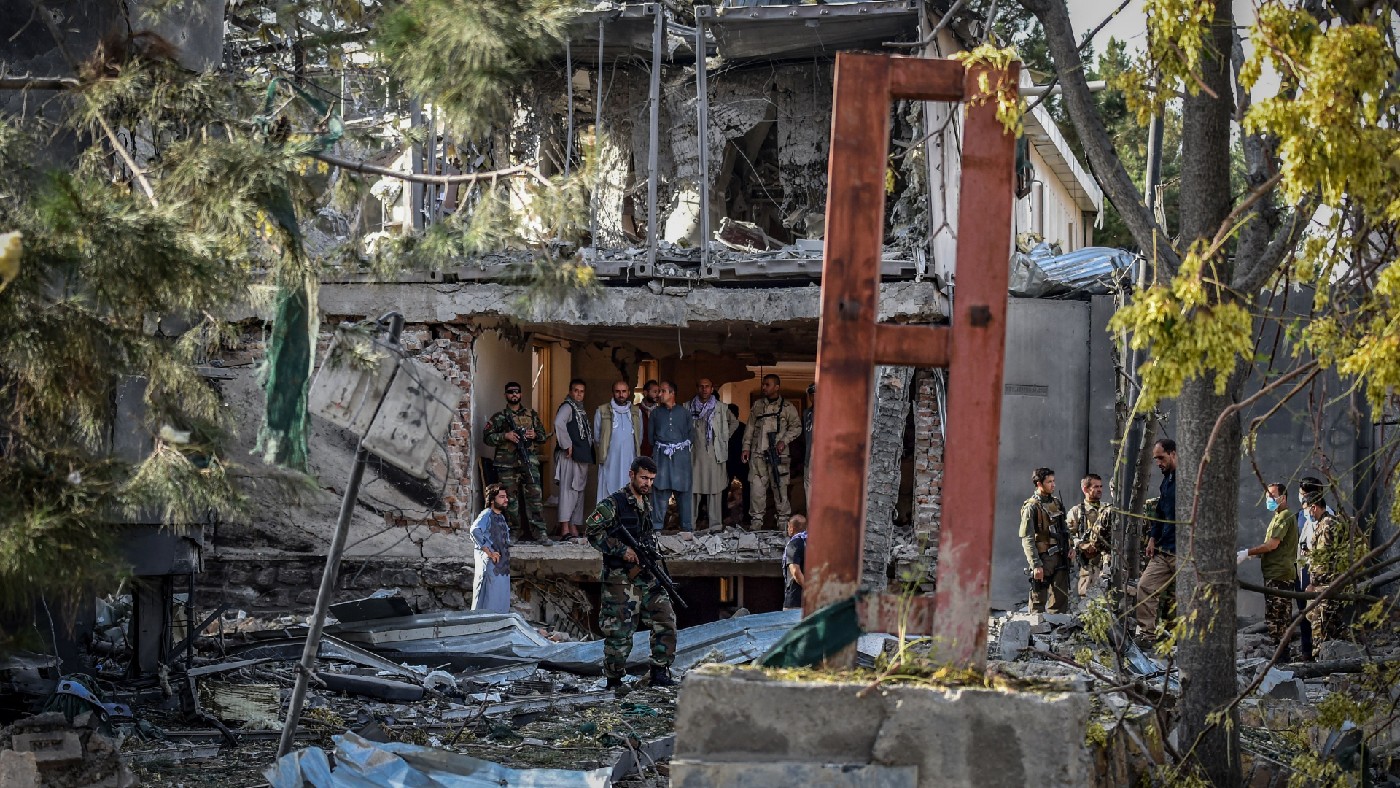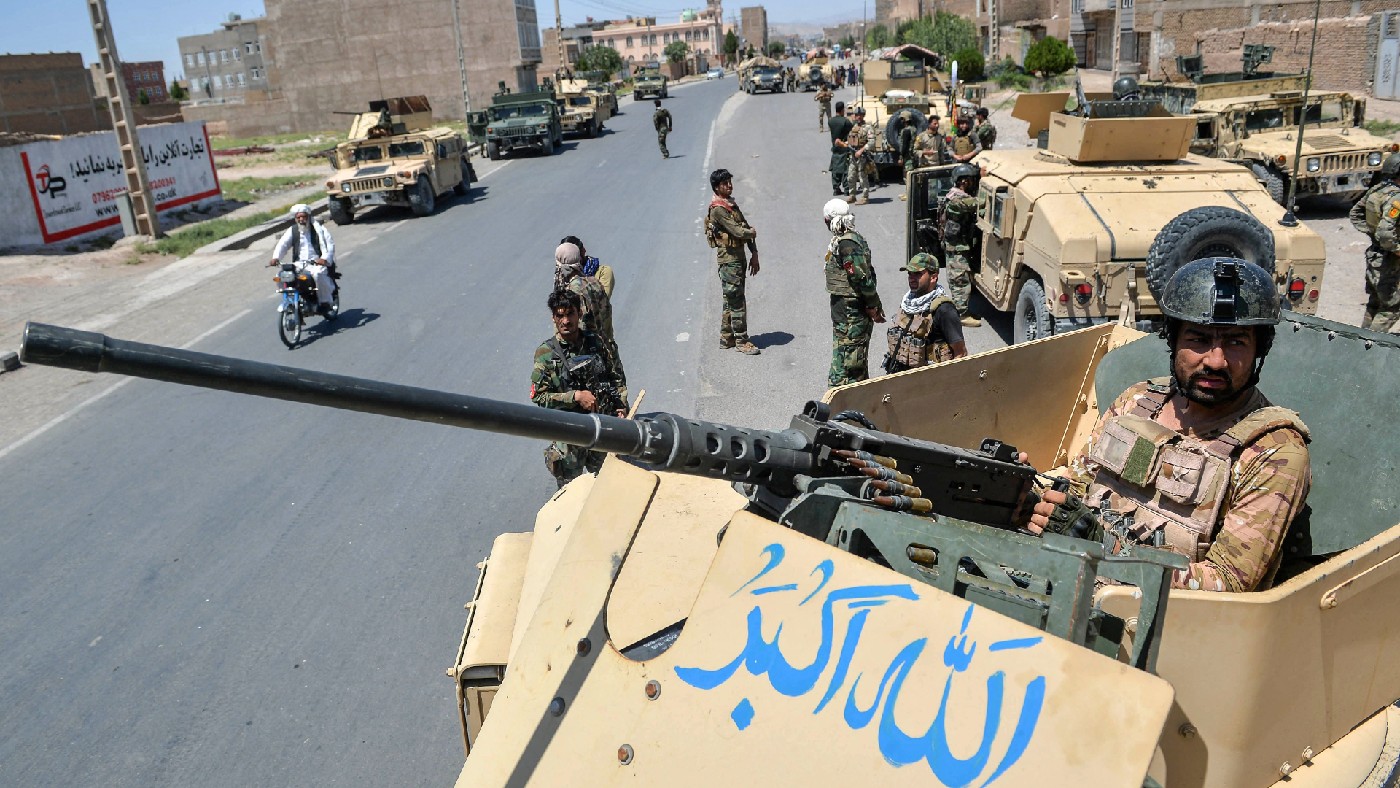Afghanistan on the brink as the Taliban seizes areas at a ‘dizzying’ pace
The Taliban made further sweeping gains this week, more than a third of the country’s 34 provincial capitals

A free daily email with the biggest news stories of the day – and the best features from TheWeek.com
You are now subscribed
Your newsletter sign-up was successful
The Taliban made further sweeping gains in Afghanistan this week, capturing more than a third of the country’s 34 provincial capitals in a matter of days. The strategically important city of Kunduz, which lies on a route that links the capital Kabul to the north, became the largest to fall to the Islamist group.
Others – including Kandahar, the country’s second city – remained under siege this week as Afghan government forces struggled to repel Taliban fighters. In Kabul, the Taliban assassinated the head of the Afghan government’s media centre, Dawa Khan Menapal.
The UK deployed 600 paratroopers to the capital to evacuate more than 4,000 Britons and up to 2,000 Afghans who are at risk of reprisals due to their work for the British military. Meanwhile, US and Afghan forces responded by pounding Taliban targets with air strikes; America also sent in B-52 bombers and Spectre gunships.
The Week
Escape your echo chamber. Get the facts behind the news, plus analysis from multiple perspectives.

Sign up for The Week's Free Newsletters
From our morning news briefing to a weekly Good News Newsletter, get the best of The Week delivered directly to your inbox.
From our morning news briefing to a weekly Good News Newsletter, get the best of The Week delivered directly to your inbox.
But President Biden insisted he didn’t regret his decision to withdraw US forces by 11 September, and called for Afghan troops to “fight for their nation”.
“The pace of the Taliban’s march through Afghanistan is now dizzying,” said The Times. Its fighters had already seized many rural areas since the US and its allies began the final stage of their withdrawal in May. Now, they’re capturing cities too – making it hard for US and Afghan forces to repel them with air strikes without killing civilians – and they could reach Kabul “within months”.
The security situation is now so perilous, the US and UK have told their citizens to leave the country, said The Wall Street Journal. Yet, somehow, the Biden administration still thinks that the crisis can be resolved through peace talks between the Taliban and the Afghan government.
As the crisis worsens, said The Guardian, pressure is growing on the UK Government to rethink its “shameful” refusal to give asylum to many of the Afghan interpreters who worked with British forces. It must bow to it – just as it has now agreed to consider giving refuge to Afghan journalists and their families at the request of this newspaper and others.
A free daily email with the biggest news stories of the day – and the best features from TheWeek.com

Afghanistan is on its knees, said Lynne O’Donnell in Foreign Policy. A million people have been displaced in its bloodiest six months since 2009; food and fuel prices have soared; and it feels as though the Taliban’s “white flag of victory” is being hoisted over more cities each day. Partly, that’s the fault of the Afghan government, which has done little in recent years to prepare for the US’s withdrawal – leaving its troops “without leadership, strategy, or even supplies” as the Taliban’s influence grew.
But much more of the blame lies with the US, said Robert Fox on Reaction.life. Washington’s “cut and run” from Afghanistan exposed a moral and strategic vacuum at the heart of US foreign policy. Moral because it leaves the country facing a return to the “rule by Taliban mayhem” it endured in the 1990s. And strategic because it risks leaving behind a Pakistan-backed regime “playing host” to terror groups such as al-Qa’eda and Islamic State, which will use Afghanistan as a base for operations worldwide.
Whoever’s at fault, said Ruth Pollard on Bloomberg, the Taliban’s resurgence is already having a grave impact on Afghan women. After 20 years of freedom, female professionals in Taliban-controlled areas are now being told they “cannot work, study, or dress as they please”, or even leave home without a male escort. In some areas, the Taliban is going from “door-to-door” compiling lists of women aged 12-45 for fighters to forcibly marry.
Most Afghans are appalled by what’s happening, said The Economist. In recent days, thousands gathered in cities such as Kabul, waving their nation’s flag and chanting “God is Greatest!” –a “direct challenge” to the Taliban’s claim of a religious mandate to rule. Their defiance has added to a conviction among military leaders that a couple of government victories could “change the dynamic” in this war of attrition. But for now, the insurgents are firmly “on the front foot”.
What next?
Russia and China began joint military drills this week, as concern mounts about instability spilling over from Afghanistan. More than 10,000 troops joined exercises in northwest China, which shares a short border with Afghanistan. Chinese state media said the drills mark a “new height” in ties between Beijing and Moscow.
The US has warned the Taliban that if it seizes power by force, it will be a global pariah; meanwhile the Taliban has pledged to step up its attacks on government officials if US air strikes continue
-
 Political cartoons for February 21
Political cartoons for February 21Cartoons Saturday’s political cartoons include consequences, secrets, and more
-
 Crisis in Cuba: a ‘golden opportunity’ for Washington?
Crisis in Cuba: a ‘golden opportunity’ for Washington?Talking Point The Trump administration is applying the pressure, and with Latin America swinging to the right, Havana is becoming more ‘politically isolated’
-
 5 thoroughly redacted cartoons about Pam Bondi protecting predators
5 thoroughly redacted cartoons about Pam Bondi protecting predatorsCartoons Artists take on the real victim, types of protection, and more
-
 Corruption: The spy sheikh and the president
Corruption: The spy sheikh and the presidentFeature Trump is at the center of another scandal
-
 Putin’s shadow war
Putin’s shadow warFeature The Kremlin is waging a campaign of sabotage and subversion against Ukraine’s allies in the West
-
 The fall of the generals: China’s military purge
The fall of the generals: China’s military purgeIn the Spotlight Xi Jinping’s extraordinary removal of senior general proves that no-one is safe from anti-corruption drive that has investigated millions
-
 Epstein files topple law CEO, roil UK government
Epstein files topple law CEO, roil UK governmentSpeed Read Peter Mandelson, Britain’s former ambassador to the US, is caught up in the scandal
-
 Iran and US prepare to meet after skirmishes
Iran and US prepare to meet after skirmishesSpeed Read The incident comes amid heightened tensions in the Middle East
-
 Syria’s Kurds: abandoned by their US ally
Syria’s Kurds: abandoned by their US allyTalking Point Ahmed al-Sharaa’s lightning offensive against Syrian Kurdistan belies his promise to respect the country’s ethnic minorities
-
 Israel retrieves final hostage’s body from Gaza
Israel retrieves final hostage’s body from GazaSpeed Read The 24-year-old police officer was killed during the initial Hamas attack
-
 China’s Xi targets top general in growing purge
China’s Xi targets top general in growing purgeSpeed Read Zhang Youxia is being investigated over ‘grave violations’ of the law